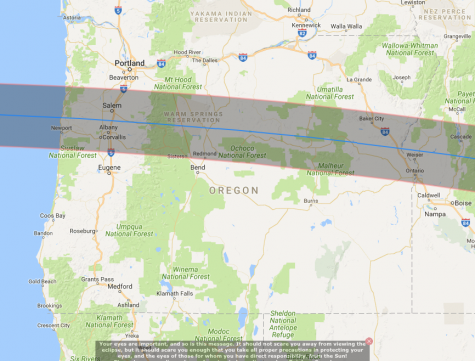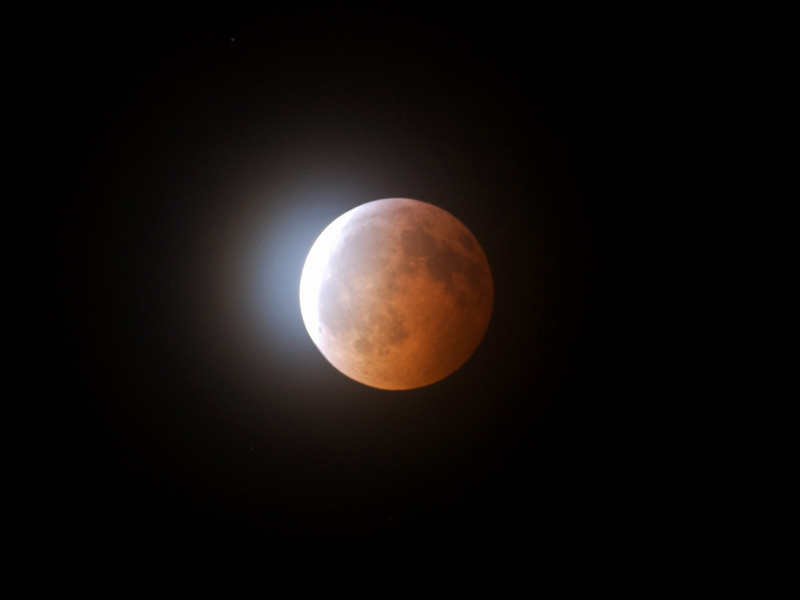The Sun Will Disappear In August — Here’s What You Need to Know
May 31, 2017
This year, millions of people from all over the Northwest and United States will flood into Oregon, arriving in anticipation of just a few short minutes. Why? On August 21, at approximately 10:00 am, the rare astronomical phenomenon known as a solar eclipse will occur over the skies of the Northwest, and lucky for us, Oregon just so happens to be one of the best places in the entire United States to view it.
A solar eclipse occurs when the moon’s orbital pattern places it between the earth and the sun, casting a shadow on a specific path of eclipse and blocking sunlight. Though there are partial forms of solar eclipses, the eclipse occurring on August 21 is a total solar eclipse, meaning that all the sun’s light will be blocked by the shadow of the moon; for a full 2 minutes and 10 seconds, the path of the moon’s shadow over the Northwest will blanket central Oregon in complete darkness in the middle of the day. Temperature will drop several degrees nearly instantaneously, and animals will scurry to their dens, thinking that nighttime has suddenly arrived.

According to the Great American Eclipse website, “the width of the eclipse path in the Willamette Valley is about 87 miles” and should pass over Oregon between 10:15 and 10:27 am. This puts many of Oregon’s central cities at the center of the path (for a detailed look into the path of totality, an interactive map can be viewed here). Since the last time a total eclipse occurred over the United States was 1979 (and the next one won’t occur over the western half of the United States until 2045), you may not want to miss the opportunity to view such an awe-inspiring natural phenomenon, especially so close to home.
A partial eclipse will be visible from Portland, but for the experience of full totality and darkness during the middle of the day, traveling to a location within the path is by far the most rewarding option. Thankfully, venues are opening around the state.
Though some more avid adventurers may want to climb Mt. Jefferson or travel to the more remote locations within the path of totality, casual viewers can alternatively travel shorter distances to the abundance of family friendly venues and solar fests around Oregon to catch the moon’s shadow.
If you are looking for an organized way to enjoy the view, many organizations are offering affordable festivals that make the total eclipse an even more enjoyable event. The Oregon Museum of Science and Industry (commonly referred to as OMSI) will host a viewing event in Salem on the day (see here for details). However, watching the solar eclipse on the western side of the Cascades is somewhat risky, given the high likelihood of overcast conditions obscuring the skies that morning.
More favorable destinations for viewing the eclipse are in the central and eastern portions of the state, which are in fact some of the best places in the entire country to view this eclipse; Madras will host the Oregon SOLARFEST, a popular festival with an abundance of activities to keep you busy while you wait (see here for details). Costs range from around $20 for a one day pass to nearly $60 for a weekend pass; the cheapest camping spot is $150. For information on even more available city festivals, click here.
But keep in mind: if you plan on attending a solar eclipse viewing event, time is of the essence, as many of these events have already sold out completely. Furthermore, many of the larger venues are expecting approximately 30,000-50,000 attendees, so if you are looking for a more secluded or private option, you may be forced to look elsewhere.
Unfortunately, at this time there doesn’t seem to be much of an ‘elsewhere’ option.
The alternative to a venue for viewing the eclipse would be to find a central or eastern Oregon state park, public land, campsite, or wilderness site within the path of totality. Through these destinations are sure to offer a stunning and memorable experience, the staggering amount of people pouring in from all over the Northwest for this event will render usually tranquil sites crowded, roads and highways overrun and stalled, and small town destinations in turmoil as they far surpass their population capacity. (For instance, it is likely that most major highways in the state will be at maximum capacity for many days leading up to and after the eclipse.)
This potentially creates a serious safety hazard.
With millions of people coming to Oregon for the event, KGW reports that an “unprecedented” safety and fire hazard is at hand. Officials in many of the effected communities have been meeting for months to come up with a plan to prepare for the influx of eclipse tourists: how will emergency calls reach maxed out cell towers, how will emergency vehicles reach emergencies, how will sites and towns care for so many people, and even where will people go to the bathroom? To add to this, August 21 happens to be in the height of forest fire season, and an abundance of people means and abundance of campfires, cigarettes, and fireworks.
Accordingly, use extreme caution if you decide to go trekking or camping on your own. If you do safely pass the crowded roads and reach your destination, be aware of your surroundings and your own footprint.
A twice in a lifetime opportunity such as this surely should not be missed. Though there are clearly some things to be cautious of, the overall experience of the total solar eclipse makes for an unusual summer endeavor, to say the least. Remember to stay safe: bring the proper supplies and gear, and plan ahead. Tto properly view the phenomenon, eclipse glasses are absolutely necessary to protect your eyes during the eclipse. Purchase cheap eclipse glasses here, or obtain a free pair by requesting a Travel Oregon visitor guide.
It is certainly not every day that the sun’s light disappears in the middle of the day; in fact, it may only happen close to us once or twice in our lifetime. The total eclipse will be the American natural event of the summer, and it happens to be in our backyard. You may want to seriously consider making plans now.
Will you be going to see the total eclipse? If so, what are your plans? Comment below!
Creative Commons photo source: https://www.flickr.com/photos/tychosnose/6138013767/





